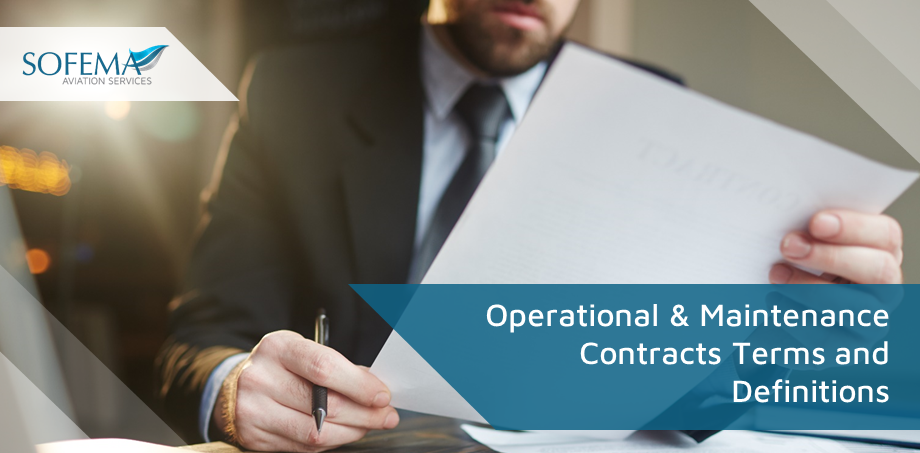Sofema Aviation Services (SAS) www.sassofia.com considers the key Terms and Definitions to be found in Operational and Maintenance Contracts.
Note: In the context of developing and managing aviation contracts, especially within the operations and maintenance environment, several typical contractual terms are fundamental to the structure and enforceability of these agreements.
Their precise definition and application are crucial for the smooth functioning of aviation operations and the mitigation of potential disputes or liabilities.
- These terms are designed to ensure clarity, compliance, and efficiency in the highly regulated and safety-critical aviation industry.
- Below are key contractual terms commonly found in aviation contracts, along with a brief description of their role and usage:
Aircraft on Ground (AOG): Refers to a situation where a problem is serious enough that an aircraft cannot fly. In contracts, AOG terms specify response times and service levels required to address such critical issues.
Arbitration: A method of dispute resolution outside of courts, where an arbitrator or arbitration panel makes a decision on the dispute. Contracts often include arbitration clauses specifying how arbitration will be conducted.
Assignment: The transfer of rights or obligations under the contract to another party. Assignment clauses specify whether the parties can assign their rights or duties to others and under what conditions.
Change Management: Outlines procedures for managing changes to the contract scope, terms, or conditions, including processes for requesting, reviewing, and approving changes.
Compliance and Regulatory Obligations: Specifies the regulatory frameworks and standards with which the parties must comply, such as those set by the Federal Aviation Administration (FAA) or the European Union Aviation Safety Agency (EASA).
Confidentiality: Obligates the parties to keep certain information confidential and specifies the types of information considered confidential, how it can be used, and penalties for disclosure.
Confidentiality and Data Protection: Protects sensitive information shared between parties during the course of the contract, aligning with data protection laws and regulations.
Dispute Resolution: Establishes the process for resolving disagreements between the parties, which may include negotiation, mediation, arbitration, or litigation.
Entire Agreement: States that the written contract represents the whole agreement between the parties and supersedes any prior discussions, agreements, or understandings.
Estimated Time of Arrival (ETA) / Estimated Time of Departure (ETD)
Force Majeure: A clause that frees both parties from liability or obligation when an extraordinary event or circumstance beyond the control of the parties prevents one or both from fulfilling their contractual obligations.
Foreign Object Damage (FOD): Refers to damage caused by foreign objects (such as debris on runways) that can impact aircraft safety. Contracts often include FOD prevention and management protocols.
Governing Law: Specifies the set of laws applied to the interpretation, enforcement, and resolution of disputes under the contract.
Indemnity: Requires one party to compensate the other for certain damages or losses specified in the contract.
Insurance Requirements: Specifies the types and amounts of insurance that must be maintained by the parties, such as liability, property, and workers’ compensation insurance.
Jurisdiction: Refers to the legal authority under which the contract is governed and disputes will be resolved.
Letter of Intent (LOI): A preliminary document indicating the parties’ intention to enter into a contract, outlining the proposed terms.
Liability and Indemnification: Outlines the responsibilities of each party in the event of loss, damage, or injury arising from the execution of the contract. It includes clauses that may limit liability or specify indemnity obligations.
Maintenance, Repair, and Overhaul (MRO): Covers the range of services provided to keep aircraft in operable condition. Contracts involving MRO services detail the scope of work, standards, and timelines for maintenance activities.
Memorandum of Understanding (MOU): Similar to an LOI, an MOU outlines a mutual agreement between parties before a formal contract is signed, focusing on the intent and understanding of collaborative efforts.
Non-Compete and Non-Solicitation: Non-compete clauses restrict a party’s ability to engage in a similar profession or trade in competition against another party. Non-solicitation clauses prohibit soliciting employees or clients of the other party for a certain period.
Original Equipment Manufacturer (OEM): Refers to the manufacturer of aircraft parts or components. Contracts often specify OEM parts for repairs to ensure compliance with safety and performance standards.
Payment Terms: Details the pricing, invoicing schedules, payment methods, and terms for services rendered. It may also include penalties for late payments.
Performance Standards and Service Levels: Defines the quality and timeliness standards that service providers must meet.
Request for Proposal (RFP): A document issued by a party seeking bids for services or products. RFPs are used to solicit proposals for maintenance, operations, and other service contracts.
Scope of Work (SoW): Outlines the specific services, tasks, or projects to be performed under the contract.
Severability: A clause stating that if one part of the contract is found to be unenforceable, the rest of the contract remains in effect.
Service Level Agreement (SLA): A formal document that defines a service provider’s performance standards and the penalties for not meeting those standards.
Termination: Outlines the conditions under which the contract may be terminated before its natural expiration date.
Termination and Exit Strategy: Defines the conditions under which the contract may be terminated by either party.
Warranty: Guarantees provided by a manufacturer or service provider regarding the condition of a product or service, including terms for repair or replacement of defective items.
Waiver: A provision that allows a party to voluntarily relinquish a known right, claim, or privilege.
Next Steps
Follow this link to our Library to find & Download related documents for Free.
Sofema Aviation Services is pleased to offer the following 2-day course Developing and Managing Aviation Contracts in the Operations and Maintenance Environment.
Please see the following link or email team@sassofia.com if you have any questions or comments.
Tags:
Aircraft Operations, and Overhaul (MRO), Estimated Time of Arrival (ETA), Aircraft on Ground (AOG), Terms and Definitions, Foreign Object Damage (FOD), Change Management, Aviation Regulatory, Repair, Aircraft, SAS blogs, Sofema Aviation Services, Maintenance, EASA, Compliance, aviation, Aircraft Maintenance





